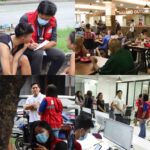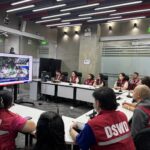“Hindi dapat tignan na masama ang social welfare. Pero ulit-ulit kong sinasabi, may development function ang Department of Social Welfare and Development (DSWD).”
This was stressed by DSWD Secretary Rex Gatchalian on Thursday (June 5) in an interview over the Bilyonaryo News Channel’s ‘At The Forefront’ program, as he gave his thoughts on the criticism that the Department is ‘ayuda-centric.’
Secretary Gatchalian explained that welfare programs should not be seen as negative as they are aligned with the mandate of the government to be the stewards of the Filipino public especially in times of distress.
“Naniniwala ako na obligasyon ng Republika o ng Gobyerno na laging tumulong sa kanyang mamamayan sa oras ng pangangailangan, yan yung social welfare. Hindi lang yan para sa mahirap, para sa ating lahat yan,” the DSWD chief pointed out.
According to Secretary Gatchalian, welfare programs and services are also done by other countries as part of the State’s responsibility in caring for its citizens, especially those experiencing crisis.
“Kahit saang bansa ka pumunta, pag may krisis na pinagdadaanan, sandigan mo dapat ang gobyerno. Sabi nga ng Pangulo [President Ferdinand R. Marcos Jr.] sa akin so many times, government should be there to bridge in times of crisis,” the DSWD chief pointed out.
Some of the welfare programs of the Department are the Assistance to Individuals in Crisis Situation (AICS), the Ayuda para sa Kapos ang Kita Program (AKAP), and the Social Pension (SocPen) for Indigent Seniors . These programs are integral to help the vulnerable sectors, and considered as the last line of help by those in need.
Secretary Gatchalian also discussed the Pag-abot Program for families and individuals in street situation (FISS) as another welfare program which was created to augment the services and interventions of the local government units (LGUs).
The social welfare chief also corrected the concept that the DSWD is the frontline agency in providing interventions to homeless individuals and families.
“Ang frontline niyan ay LGUs. I was a Mayor and we had our own reach out operations in Valenzuela. Pero dahil alam ko ang pagiging Mayor, na hindi kaya ng resources ng LGU, gumawa tayo ng isang programa na ang tawag ay Pag-abot reach out program,” the DSWD chief said.
Under the Pag-abot Program, the DSWD collaborates with the LGU’s social welfare and development offices for the conduct of the reach out activities. Using a rights-based approach, the reach out teams try to convince those living on the streets to be a beneficiary of the program.
Secretary Gatchalian stressed that aside from the “ayuda” programs, the agency also implements programs and services as part of its development functions. These programs are long-term and with the objective of assisting the poor, vulnerable, and marginalized sectors into achieving development.
“May development function kami, yun yung pangmatagalang solusyon. Dapat left [ayuda] and right [development] yan. At ang isa sa pinakamalaki nating development program ay ang Pantawid Pamilyang Pilipino Program (4Ps) program. Hindi yan ayuda,” Secretary Gatchalian explained.
The 4Ps, as emphasized by the DSWD chief, was designed to break the intergenerational cycle of poverty with education and health conditionalities, as well as participation in Family Development Sessions that beneficiaries must meet.
Secretary Gatchalian understands the public’s focus on the DSWD’s welfare programs as development takes time.
“Development does not happen overnight. Kaya nga mas sikat ako na social welfare kesa development. Ang pakilala sa akin lagi Department of Social Welfare, nakakalimutan ang apelyido ko, ang Development. Kasi ang social welfare instant gratification. Iabot mo, yung kaharap mo masaya na. Pero sa development, whether we like it or not, magtatanim ka,” the DSWD chief said.
In pursuing its mandate, Secretary Gatchalian said the DSWD adopts the whole-of-nation-approach in the implementation of its social welfare and development functions.
The Department, according to Secretary Gatchalian, partners with other government agencies to ensure a more comprehensive intervention for the poor, vulnerable, and marginalized sectors and also in pursuant to the directive of President Marcos for a convergent approach to governance.(GDVF)


